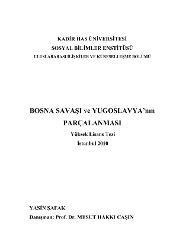| dc.description.abstract | Bosnia-Herzegovina is a country which is located at the East of Europe and at the West of Balkans. Destiny of the country is obvious from its geography and its population. The lines springing down from Eastern Europe till the Adriatic and Aegean Sea are places where the history-long migrations, invasions, fights of large states and ethnical and religious colorfulness can be observed. The State of Bosnia, formed with its borders almost as the ones today and its independent Church of Bosnia, did not have a very long life and lived until the 20th century, dependent on other big states. These states were Hungarian Kingdom, the Ottoman Empire and Austria-Hungary, respectively.Bosnia is a country within the square of Europe, North Africa, Middle-East and Balkans, where national states have now been greatly homogenized, wherein Catholic, Orthodox and Muslim societies lived for many centuries as well-known entities. However, what has recently brought Bosnia to the fore is not its ethnic and folkloric features that potentialized it with constructive and destructive will, but it is the fact that Bosnia has been the tying and resolution point of crises wherein a great variety of actors took roles. The lands named as ?The Eastern Problem? in the European Diplomacy are considered to be starting from Bosnia. The Great Powers were so correlated in crises of Bosnia and Macedonia that the pretex that caused World War I sprang from Sarajevo, the capital city of Bosnia.The state model after World War I, idealized by winners of this war, was also applied by the Slavic societies in the south and the Yugoslavians were integrated. With World War II, Yugoslavia and its affiliate Bosnia-Herzegovina had their share of invasions. The new Yugoslavia was founded as a socialist federation on the land which could be saved thanks to the partisan resistance in World War II. This state was not an idealized state model in the East Block and the Capitalistic World, but a tolerated one.Bosnia-Herzegovina is one of the six republics that form the socialist federation. The federation weakens after the death of Tito and nationalist politics start to rise again in all Yugoslavia, Serbs and Croatians leading the way. A process which the European Community of the time was experienced in such a haste and Yugoslavia starts to disintegrate. In 1992, the Bosnia War, which was going to be the hardest level of the disintegration, breaks out.Impact of the international actors on Yugoslavian Wars of the 90s are less, compared to the previous years. If there are any responsibilities, there are rather on failure to prevent the crisis, conduct determinations correctly and apply the policies that could end or marginalize the war. The United Nations were considered to be the keen but unsuccessful actor of the Bosna War between 1992 and 1995. The most basic reason of this is failure of Western central states to realize a common policy and almost sabotaging each other. The consequent gap is filled by the USA. It can be said that NATO?s first out-of-zone intervention, if not legal, comes with the Bosnia War. While the USA establishes its strength on desks of diplomacy, NATO orchestrates the intervention of its mother entity, United Nations, in the last year of the war.The Dayton Treaty, which ends the war, is prepared within the direction of USA. The Dayton, which ends the war in Bosnia-Herzegovina, has established one of the most interesting states of the world. A country formed by a federation and a republic is formed by the Bosnian-Croatian Federation and Serbian Republic.The Dayton Treaty succeeded in ending the war. No fights have broken out since. This can be due to the crestfallenness of the three Bosnian entity, as much as the success of this treaty. No ethnical cleansing or political or military internments gave more than temporary and relative superiority. For this reason, there is still the State of Bosnia-Herzegovina wherein there is no internal conflict, but no ideal cooperation in the mechanics either. | en_US |
















